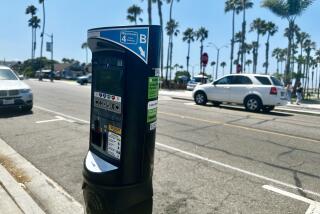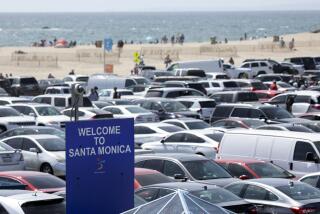Peso’s Worth Is Deceiving, City Complains
- Share via
There are 4,500 places in San Diego where a peso is worth as much as a quarter, and it’s costing the city $15,000 a year.
Because the Mexican peso is so similar to the U.S. quarter in size, it’s being used in increasing numbers in the city’s parking meters, giving patrons a full hour of parking for one-sixtieth the normal cost. (The peso is trading at 245 to the dollar these days.)
But the cheap parking will change beginning in July, when all the meters in San Diego will be equipped with new peso-proof coin slots, at a cost of $3.50 per meter and totaling $15,750 for the entire city.
According to parking meter supervisor Charles Flowers, the new coin slots will be smaller in height and width, tailored to fit the quarter and exclude the peso, which is a shade thicker and taller.
“The peso is very inexpensive, readily available and is now more prevalent in San Diego,” said Dave Wood, deputy director of the city’s Department of General Services. “It’s not a major problem, by any means, but we are going to change the slot boxes so that only American coins fit.”
The city made $2.4 million from the meters in 1984, according to Steve Shushan, financial analyst for the city treasurer’s office.
Pesos aren’t the only illegal coins found in the meters. Coins from more than 140 countries have been used in San Diego’s parking meters, according to Flowers. Other popular coin substitutes include tiddlywinks, slugs, “shaved” pennies and nickels, washers and plastic discs.
“In the old days, when the meters were made, they didn’t figure on people doing this,” said Flowers, who has been working in the city’s meter shop for seven years. “There used to be a lot of honest people then.”
Using illegal coins or objects in the meters is a misdemeanor but the law is so difficult to enforce that an offender has only a minimal chance of being detected, according to police spokesman Bill Robinson. He said the few who have been caught were issued a warning or a citation.
Meters aren’t the only machines cheated by the phony coins. Vending machines and pay phones are also easy targets. But according to ARA Services spokesman Ed Little, whose company has 1,500 vending machines in San Diego, the industry’s new electronic change acceptors reject all phony coinage and have eradicated the problem. Pacific Bell said that its coin slots also have become so sophisticated that the bad coins aren’t considered a problem anymore.
The first phase of peso-proofing the meters will begin in eight weeks and involve the renovation of 1,000 meters downtown, one of the biggest problem areas, Wood said. If the new coin boxes prove effective, the meters in Hillcrest, El Cajon and the harbor area will be changed later this year.
More than 20 pounds of illegal coins are fished out of the city’s meters every week. All the foreign coins are sent to the city treasury, where they are separated by nationality and, if possible, exchanged into American currency.
Unfortunately, the treasurer’s office cannot find any bank or money exchange business that will handle the thousands of pesos it receives weekly. According to Melanie Fletcher, an accountant in the city treasurer’s office, all the money that isn’t exchanged is tossed into a large money bag and given to the Police Department for its quarterly auction of unclaimed property.
More to Read
Sign up for Essential California
The most important California stories and recommendations in your inbox every morning.
You may occasionally receive promotional content from the Los Angeles Times.











